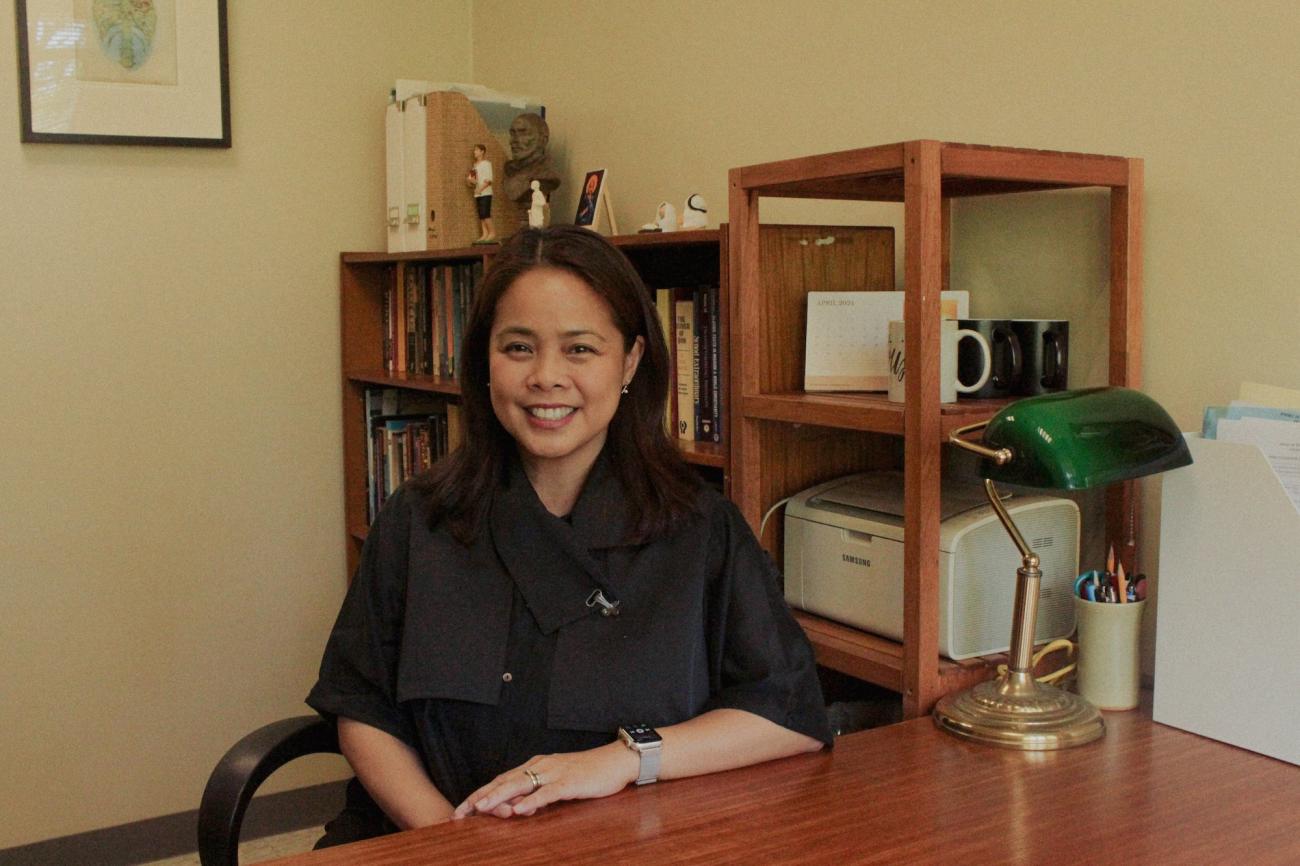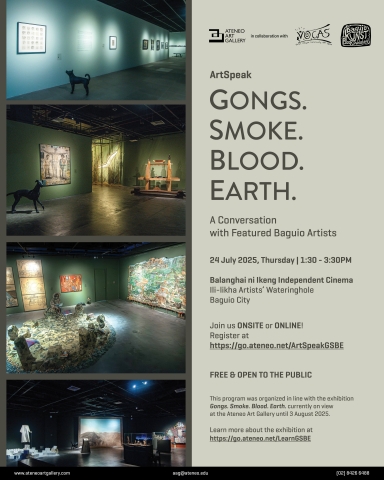SOH’s new Dean Patricia Lambino on the need for the humanities and why it is essential to Ateneo’s identity
01 Jun 2024 | Renée Nuevo
“I don’t think Ateneo could be Ateneo without the humanities,” says Patricia Lambino PhD, the new Dean of the School of Humanities. Get to know more about her, the challenges she anticipates as she leads the school, and how she envisions the future of SOH
WHEN PATRICIA LAMBINO (née Panganiban)—or Trish, as she is known to colleagues, and Doc Trish to her students—entered Ateneo at 16, she wasn’t really sure what to expect. A management major who graduated high school from School of the Holy Spirit of Quezon City, the would-be Dean of the School of Humanities chose her program because she believed it was the most flexible choice for her. “When I entered college, I was just open to a lot of things because I did not know what I wanted,” she shares during our conversation in her office at the Theology Department, a month or so before she is due to move downstairs to the Dean’s Office on the first floor of Dela Costa Hall.
Throughout her time as an undergrad, she found herself interested in many different things, but most notably the arts and humanities. “History, literature, religion, music, dance, the humanities as a whole—I loved the humanities.” Trish says. She was a member of the Ateneo Management Association (AMA); she was also a part of the now-defunct Galian ng Sining at Kultura, an umbrella structure for arts organizations in Ateneo in the nineties, with Cholo Mallillin of the Office of the Associate Dean for Student Affairs and Rica Bolipata Santos, director of the University Press.
“We organized song competitions, called Himigsikan, and the Festival of the Arts. That was a week-long celebration, with poetry readings and performances in the Colayco garden,” she adds. Among those poets she remembers are Dr Assunta Cuyegkeng, now of the Gokongwei Brothers School of Education and Learning Design, and Dr Rofel Brion of the Interdisciplinary Studies Department.
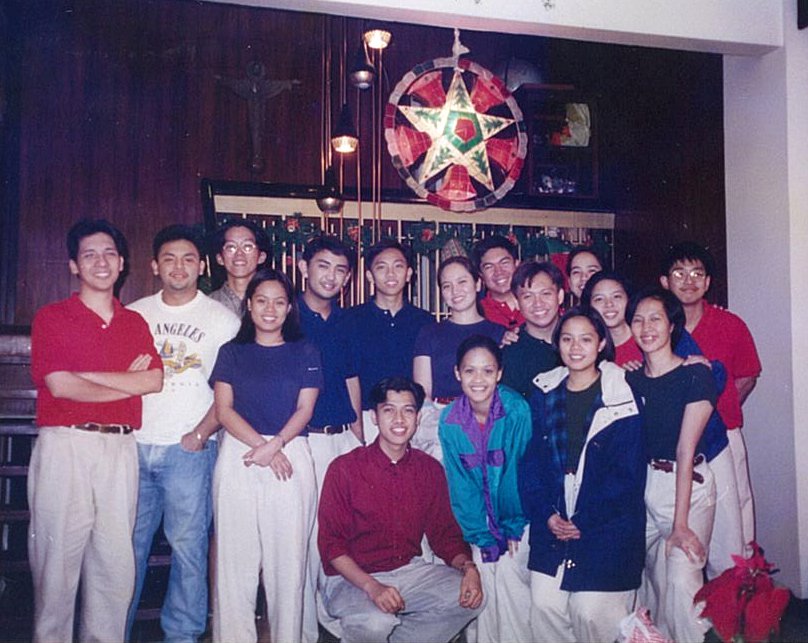
She was also a founding member of Hangad Music Ministry, when her choir from high school merged with the all-male choir from Ateneo High School. “We formed the group to sing during the 11:30 a.m. masses at the college chapel. Then it grew,” she says. “At first, we just had regular rehearsals, then singing at school liturgies, and then eventually, singing at concerts, weddings, everywhere, then recording albums, et cetera.”
College, she says, was a blast. Ateneo opened her eyes and her mind to a world of varied experiences and so many possibilities. What she often had to contend with, then, was how to best spend her time.
“The feeling of wanting to do everything was always present. I wanted to be involved in this, in that, but then I had to choose. I was pulled by different forces: hang out with friends, study for exams, do org work. My experience was very ordinary in that sense—that’s every college student’s struggle. But then time management is never just about your schedule. It’s really a question of priorities. Finding what was important to me, I guess, was the . . .” she trails off, restarting her sentence. “I wasn’t one of those people who had everything sorted out from the very beginning, with a clear ambition and dream.”
“The feeling of wanting to do everything was always present. I wanted to be involved in this, in that, but then I had to choose. I was pulled by different forces: hang out with friends, study for exams, do org work. My experience was very ordinary in that sense—that’s every college student’s struggle. But then time management is never just about your schedule. It’s really a question of priorities”
Even until graduation day, what she wanted to do after college wasn’t yet set in stone. “Like any good student,” she says, she sent in applications to different companies, and even did an internship at a bank in her junior year. “You go through the motions, you submit your applications,” she says. At her graduation in 1996, she ran into a blockmate who she knew was going to teach theology. “She was one of those people who was sure what to do after college. I, on the other hand, was still choosing among a few things, so I told her that I was very happy for her and that I was so excited that she was teaching,” Trish says.
“But then before graduation, you know that space between your last exam and the actual graduation ceremony, you have something like a month or a few weeks? What I did then was life-changing,” Trish says. “It was my 8-day retreat in Mirador in Baguio.”
“That was when I learned that I needed to make a commitment of sorts . . . and that was to teaching, and of the many subjects I wanted to explore, maybe, theology. Because of the discernment process that the 8-day retreat provided, I felt more certain that this was the first path I wanted to try, versus the others. Not that those other options were wrong, or bad, or boring. I never felt that,” she says. But Trish found that this was where she was being led.
“My faith plays a role in the important decisions I make. It’s something that I value greatly—that’s why I was attracted to theology, and the reason I am a theologian is so that I can study faith more, analyze it, and share it,” she says. As she began teaching and soon embarked on the master’s degree, her interest in theology eventually found its focus in religious education. Her first mentor was Fr Joseph Roche SJ, professor emeritus of Ateneo’s Philosophy and Theology departments. He also taught at the Loyola School of Theology and the Mother of Life Catechetical Institute, and in 2006 was bestowed the “Pro Ecclesia et Pontifice” award by Pope Benedict XVI.
“My faith plays a role in the important decisions I make. It’s something that I value greatly—that’s why I was attracted to theology, and the reason I am a theologian is so that I can study faith more, analyze it, and share it”
“Through him and his work, I realized that so much work needed to be done in the space of religious education. How did I find my interest? It was need,” Trish says. “It was the need for helping people find ways to better speak of God and faith, that really resonated. There were a million and one people vying for a limited number of attractive jobs in management. Here [in religious education], there was a huge gap, a space, an opportunity. That was how that research interest was born. As I did further studies, the questions gained focus, and some of my skills were honed.”
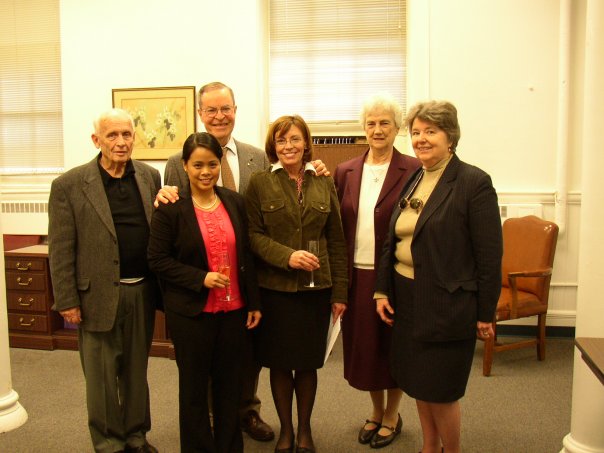
“I ended up doing my master’s thesis in religious education. I focused on this one approach to theology—the communio approach—drawn from theological aesthetics. [It’s a] way of doing theology that focuses on the emotions, the imagination, and art, and beauty, and how we use all of that in religious education.”
Since then, she has received her MA in Theological Studies from the Loyola School of Theology in 2001 and her PhD in Religious Education and Catechetics from the Catholic University of America in 2010. She has also served as coordinator for the faculty cluster of the Discerning Life Questions (DLQ) course, a theology course that aims to “cultivate a deeper awareness of the meaning and purpose of one’s life in the face of suffering, brokenness and finitude towards happiness, wholeness and transcendence.”
Beyond this, she also headed the Formation Institute for Religion Educators (FIRE), founded by her mentor, Fr Roche, and oversaw the Department of Theology’s MA Program from June 2017 to May 2020. She has edited and reviewed for local and international peer-reviewed journals, and has taught graduate courses at the East Asian Pastoral Institute (EAPI) and Loyola School of Theology (LST).
*
“IT’S THE PEOPLE OF SOH THAT HAVE SHAPED ME,” Trish says, when asked how studying and working in Ateneo has formed her. “Your relationships shape you. These people are my very good friends—we’ve known each other for decades. Someone like Fr [Adolfo] Dacanay [SJ], he knew me when I was 18, up to now. And so, so many others,” she says.
“I met my husband, Tony, here too. He was teaching at the English Department and the Comm Department in 1999 and we became friends. Fast forward to 2005, we got married, and now we have one daughter,” Trish shares, smiling brightly. “My worldview, values, routine [are also shaped by the university]. So much of my life revolves around this place.”
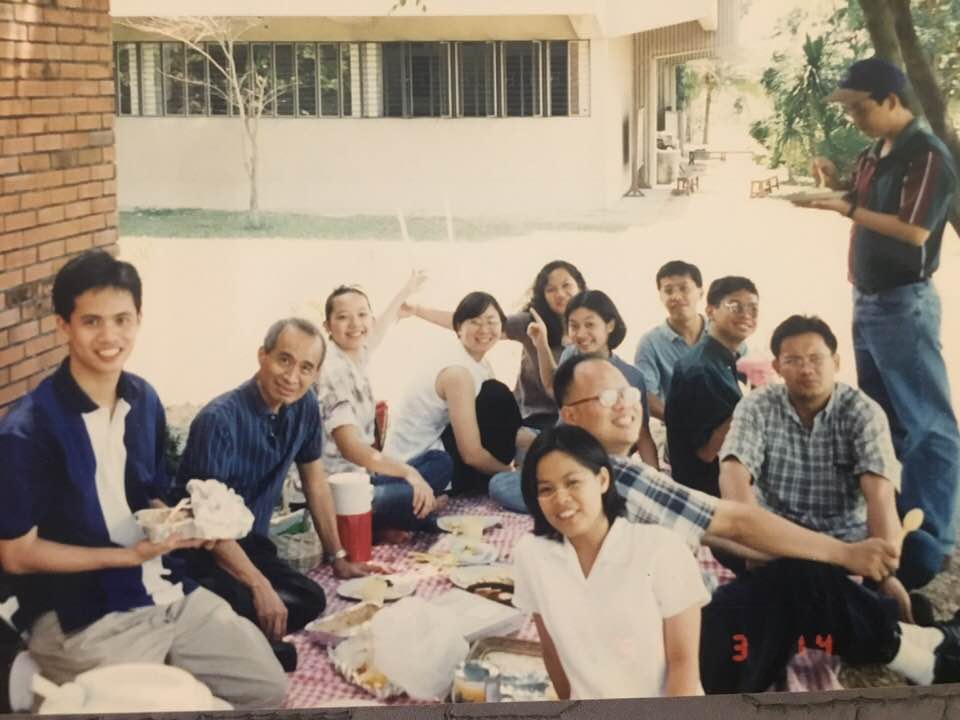
Just then, a yellow bird flies outside her window, perching on a tree branch in perfect view from her office. “Good for the soul,” Trish says. “I take pictures of them and then I open the window. During the lockdown, ang dami nila—big ones, colorful ones. This tree attracts so many [of them]. I’m happy to be on this side of the department.” Sometimes, there’s even music, coming from student-musicians rehearsing somewhere on the campus grounds.
The deanship was formally offered to her by University President Fr Roberto Yap SJ upon the recommendation of Dr Maria Luz Vilches, Vice President for Higher Education, and herself once the Dean of the School of Humanities. “Doc Marlu believed that I was the right person for the job at this time,” Trish says. “Why? Because she thinks that I have the necessary skills, and she thinks that I can address what the school needs now. I can only hope that I can grow into the role bit by bit. I have pretty big shoes to fill.”
“When I was reflecting on and praying about the offer, I thought maybe this is really how God works in my life. God prepares me for things. I’m always led—brought, even. I don’t want to imply that I was ordained to this all, just that, when I need to decide, I ask, meron ba talaga akong magagawa diyan? Maybe by taking this job, the commitment I made to teaching all those years could be deepened.”
As an example of what she could do as dean, she shares, “There is the perennial challenge of promoting the humanities and arguing for their value. And here at Dela Costa, we are so convinced of the intrinsic value of the humanities. But I don’t know about others. What are the humanities anyway? They are all these fields of study, [all these] disciplines, and modes of inquiry that deal with the human. What is the human? It’s that question. That will be forever relevant. [But] the answers and the way one asks that question, will forever change for as long as the world is changing. Maybe I can offer some service to that pursuit as an administrator.”
“What are the humanities anyway? They are all these fields of study, all these disciplines, and modes of inquiry that deal with the human. What is the human? It’s that question. That will be forever relevant. But the answers and the way one asks that question, will forever change for as long as the world is changing”
Ateneo, an institution of higher education that calls itself Filipino, Catholic, and Jesuit, is founded on the humanities. And Trish agrees. “I don’t think Ateneo could be Ateneo without the humanities,” she states. “It’s essential to our identity. Some would even say the reason we use core curriculum, as opposed to Gen Ed, is because core curriculum is meant to communicate that we find those subjects central to the education that we offer, and the bulk of those are from the humanities. They give our education a big part of its identity.”
But it’s hard to make a case for it when the world does not realize the importance of the humanities; when other paths look and feel more secure, more stable. Still, Trish remains hopeful: “We are the smallest school in the sense that we have the fewest majors. That’s a sign of something, right? Among the many degree programs, BFA Information Design has the most students and second to them, Interdisciplinary Studies. Every other program has a small cohort.”
“I think that has a direct connection with employment,” she says, later referencing the song “What Do You Do With a BA in English?” from Avenue Q. “Maybe students are attracted to BFA ID because Information Design sounds like something that will get you a job after college; and then IS is flexible enough that it can allow you to find your path, to tailor your program. Students always have to think about job prospects.”
Nevertheless, she believes in the strength of the humanities and the arts, and she knows that a change in mindset can steer one to the right direction. “What we learn in the humanities are transferable skills, and ultimately, a larger vision. Some people (like parents) get nervous when their children enter our field. I understand that,” she says. “But I wish that we could drum up more possibilities, shore up the opportunities for our students.”
She anticipates the challenges that come with the deanship. First, there are the challenges that are more “in-house,” she says. “The ad intra challenges. It really just has to do with our ‘plumbing.’ We’re undergoing transitions, organizational changes. That I’m expecting for sure. [There needs to be] a lot of detailed work; I have to be wise in creating structures, processes, and using money.”
“In our philosophy and theology courses, we put under disciplined scrutiny, our faith, our intellect, knowledge, truth, thinking itself. When else and where else do you get to do that? I don’t think we can call ourselves a Filipino, Catholic, and Jesuit institution without those subjects”
“But I think it’s the ‘ad extra’ stuff that is more challenging. More unknown and unpredictable. When you bring in, for example, the reality of artificial intelligence, the question gets raised—what does that mean for our humanity? The same goes for post-truth, globalization, the digital world . . . what new problems and opportunities arise with those forces? What sort of humanity must evolve?”
Trish sees it as her job to help find—or at least, articulate—answers to these questions and these dilemmas, and lead the school in this search, while supporting the students all the way. “There’s definitely a need for [the humanities] and alongside that, a need to keep rationalizing our existence and the space we occupy in this university and in the world. For example, in our philosophy and theology courses, we put under disciplined scrutiny, our faith, our intellect, knowledge, truth, thinking itself. When else and where else do you get to do that? I don’t think we can call ourselves a Filipino, Catholic, and Jesuit institution without those subjects.”
And so as Trish herself was shaped by Ateneo, and, through these last twenty-or-so years, the School of Humanities, she must also shape the school the best way she knows how.
*
IN COLLEGE, Trish’s favorite subjects were her theology and philosophy courses, “especially philosophy of religion,” and history, “especially Rizal.” She avoids the question of who her favorite teacher was; instead, she says, “the teacher I learned from the most was Fr Dacanay.” She always valued subjects where she had to read intensively and where she would receive a lot of feedback, because those subjects were the ones that really sharpened her thinking and truly helped her learn. “And [that was] Fr Dacanay’s class.”
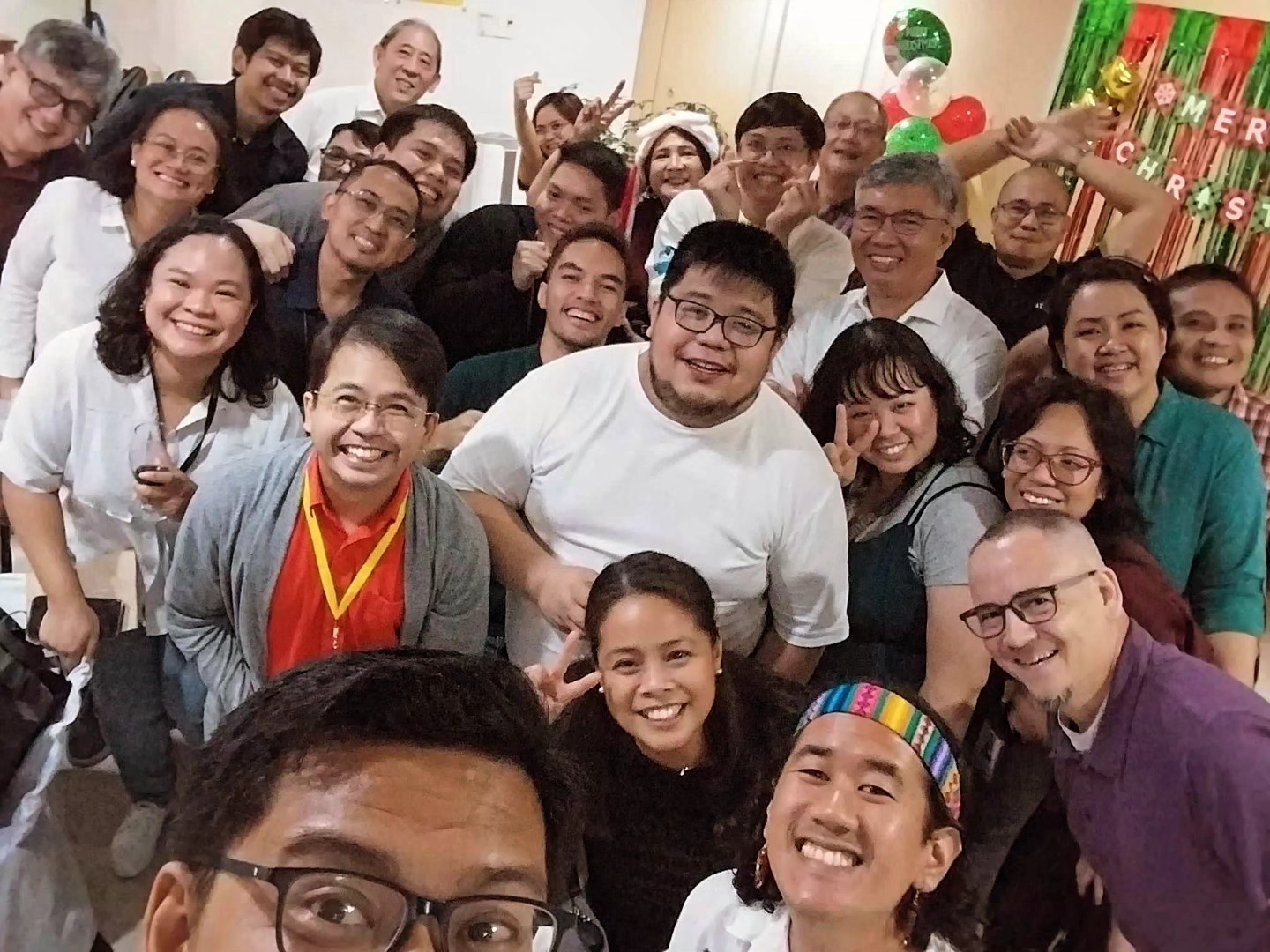
Now that she herself is a professor with a well-regarded and continuously growing career, she now gets to experience the joy of learning from the other side. In particular, she notes the “student turnaround experience” to be a special feeling. “You have a student who’s skeptical, or not doing well academically, or going through mental health [issues], and then later on, tells you that the course made a difference. That is always memorable,” she says.
Other experiences that she has found memorable: working with graduate students where the mentoring is more intense, especially the “midwifing aspect” of thesis writing. More recently too, she worked on Core Curriculum revisions and the new subjects she helped develop, especially DLQ10 Discerning Life Questions. For Trish, whose faith plays a crucial part in her living, discernment is one of the most important qualities befitting the new role and responsibility placed upon her shoulders.♦
